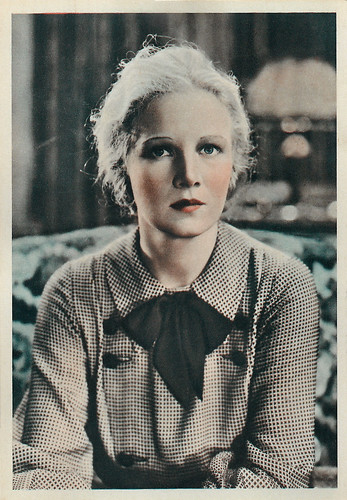
British postcard by De Reszke Cigarettes, no. 21. Photo: Paramount. Caption: An established stage actress, and a warm favourite with the public long before she embarked on a screen career. Was ambitious to become a writer, and with this object in view, she became a scriptwriter for Paramount. Then came her first part - that of feminine lead in a small play. The star of such film successes as Holiday, The Conquerors, The Right to Romance, and Gallant Lady.

Italian postcard by Cinema-Illustrazione, series II, no. 22. Photo: Fox Film. Ann Harding and Conrad Nagel in East Lynne (Frank Lloyd, 1931).
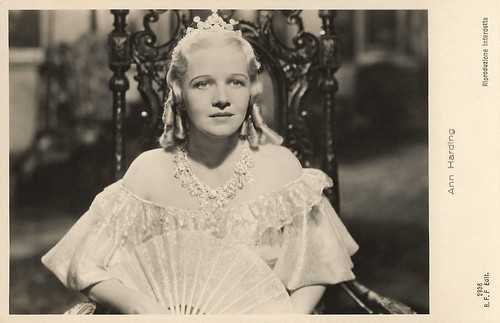
Italian postcard by B.F.F. Edit (Ballerini & Fratini, Firenze), no. 2936. Photo: Paramount Pictures. Ann Harding in Peter Ibbetson (Henry Hathaway, 1935).
Broadway's bright new star
Ann Harding was born Dorothy Walton Gatley in San Antonio, Texas, in 1902. The daughter of Army Captain George G. Gatley and his wife Elizabeth Walton Gatley, Ann spent a lot of time travelling around the US whenever her West Point-educated father was transferred. Moving to such places as Illinois, Kentucky, New Jersey, Cuba, and Pennsylvania made it very hard to put down roots.
By the time the family settled in New York, Ann was well out of high school. Ann first appeared on the stage while she spent a year attending Bryn Mawr College. She became a clerk with the Metropolitan Life Insurance Co., her college education put aside owing to financial difficulties. She went to work as a freelance script reader with the film company Famous Players-Lasky.
After attending a play in New York City, Ann discovered that the acting company was holding auditions for a part, and she decided to give it a try. To her surprise, she won a large part. She received critical acclaim for her role in 'Inheritors' (1921) and decided she would continue her budding career. Because her father opposed her career choice, she used the stage name, Ann Harding.
For the next eight years, Ann performed in a variety of stage productions and became Broadway's bright new star. In 1929, Harding was signed by Pathé Studios and made her film debut as Mary Hutton in the Pre-Code early-talkie film Paris Bound (Edward H. Griffith. 1929), co-starring with Fredric March. Later that year she starred with her husband, Harry Bannister (whom she married in 1926 and divorced in 1932) in Her Private Affair (Paul L. Stein, 1929). The film was an enormous commercial success.
Harding's performances were heralded by the critics, who cited her diction and stage experience as assets to the then-new medium of 'talking pictures'. Her role in Condemned! (Wesley Ruggles, 1929) opposite Ronald Colman, for which she was loaned out to United Artists, rounded out her work for that year. Back at Pathé, she starred in the romantic comedy Holiday (Edward H. Griffith, 1930), the film that solidified her image as an actress. During this period, Ann Harding was generally considered to be one of cinema's most beautiful actresses, with her waist-length blonde hair being one of her most noted physical attributes. Next up was The Girl of the Golden West (John Francis Dillon, 1930), which again had her husband in the second role.

Spanish postcard in the Series Estrellas del cine, no. 124. Photo: Fox Film.
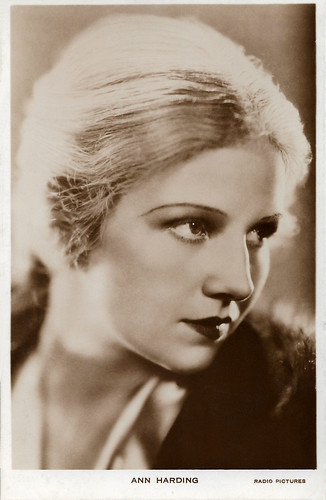
British Real Photograph postcard. Photo: Radio Pictures.
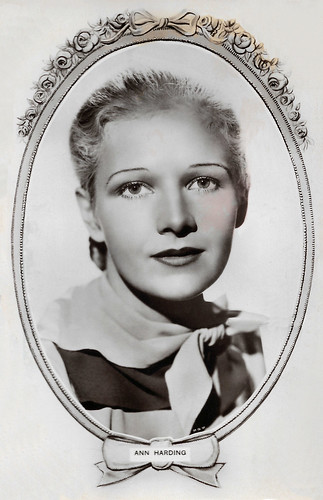
British postcard in the Cameo Series, London, no. K 46. Photo: M.G.M.
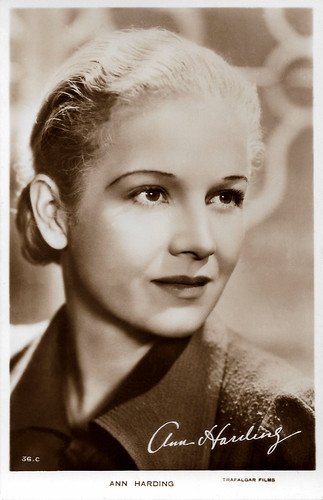
British Real Photograph postcard, no. 36.C. Photo: Trafalgar Films. Publicity still for Love from a Stranger (Rowland V. Lee, 1937).
The beautiful, innocent, self-sacrificing woman
Ann Harding was a leading lady now. She was loaned out to Fox to play Lady Isabella in East Lynne (Frank Lloyd, 1931) opposite Clive Brook. During production, her husband would show up on the set and try to tell the director how to run the film. He was finally banned from the set, and it hastened the demise of Ann's marriage to him. She was the gentle, refined heroine in The Animal Kingdom (Edward H. Griffith, 1932), wherein she played Daisy, the rejected fiancee of Leslie Howard. By 1933, her popularity started to decline as she appeared in a parade of tearjerkers as the beautiful, innocent, self-sacrificing woman, and film work became harder for her to obtain.
After appearing in the British-made Love from a Stranger (Rowland V. Lee, 1937), she married conductor Werner Janssen. Ann took a five-year hiatus from acting, not appearing on-screen until Eyes in the Night (Fred Zinnemann, 1942) with Edward Arnold. After Christmas Eve (Edwin L. Marin, 1947), she appeared second-billed in Two Weeks with Love (Roy Rowland, 1950) starring Jane Powell and Ricardo Montalban.
Then followed a part in The Unknown Man (Richard Thorpe, 1951) with Walter Pidgeon. Her final films were Strange Intruder (Irving Rapper, 1956) starring Edmund Purdom, and The Man in the Gray Flannel Suit (Nunnally Johnson, 1956), in which she appeared once again with Fredric March, the man with whom she started her career.
She worked occasionally in television between 1955 and 1965, and she appeared in two plays in the early 1960s, returning to the stage after an absence of over 30 years. In 1962, she starred in 'General Seeger', directed by and co-starring George C. Scott, and in 1964 she appeared in 'Abraham Cochrane' and 'The Corn is Green'.
After her 1965 retirement, she resided in Sherman Oaks, California. In 1981, Ann Harding passed away there, at age 79. Harding had a daughter, Jane (1928-2005) with her first husband, Harry Bannister. Their divorce in 1932 led to a year-and-a-half-long custody battle. Her second marriage, to Werner Janssen, ended in divorce in 1963. From this marriage, Harding had two stepchildren, Alice and Werner Jr. Harding began living with Grace Kaye, an adult companion, later known as Grace Kaye Harding. Harding referred to Kaye as her daughter. Following her death, Ann Harding was interred at Forest Lawn Memorial Park (Hollywood Hills) in Los Angeles, California, in the Court of Remembrance.
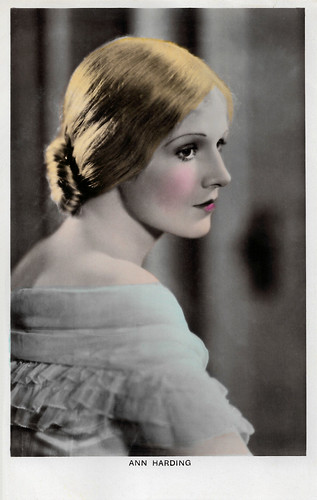
British postcard in the Colourgraph series, no. C.67.
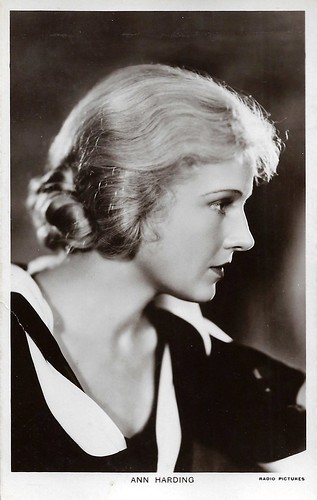
British postcard in the Picturegoer Series, London, no. 436c. Photo: Radio Pictures.
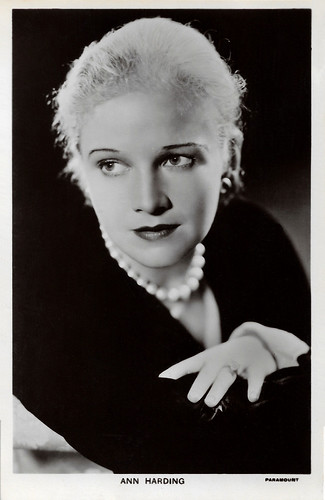
British postcard in the Picturegoer Series, London, no. 1085. Photo: Paramount.
Sources: Tony Fontana (IMDb), Denny Jackson (IMDb), Wikipedia, and IMDb.
This post was last updated on 10 August 2024.
No comments:
Post a Comment